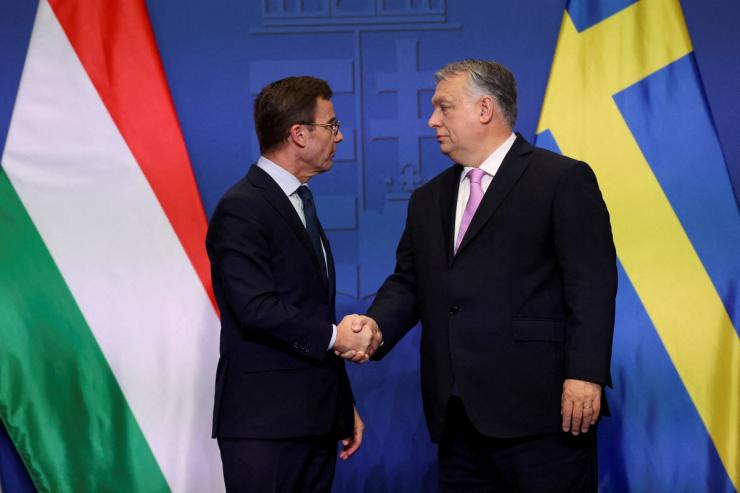The News
The Hungarian Parliament voted in favor of Sweden’s bid to join NATO on Monday following months of delays.
“Today is a historic day,” Swedish Prime Minister Ulf Kristersson wrote on X. “The parliaments of all NATO member states have now voted in favour of Swedish accession to NATO. Sweden stands ready to shoulder its responsibility for Euro-Atlantic security.”
Under NATO agreements, all members must unanimously agree to admit new states into the alliance.
Sweden has typically adopted a neutral stance in military conflicts, but took the historic step of seeking to align itself with the defense alliance after Russia’s full-scale invasion of Ukraine two years ago. That move was opposed by Hungary and Turkey, which demanded concessions from Stockholm in order to agree to its membership.
Budapest’s decision to bring forward the membership vote on Monday followed a meeting between Kristersson and Hungary’s Viktor Orbán last week. “We are ready to fight for each other, to give our lives for each other,” Orbán told a press conference after Stockholm committed to providing Hungary with a large defense package that includes access to warplanes and the establishment of an artificial- intelligence research center in the nation.
SIGNALS
Sweden’s ascension doesn’t turn Baltic Sea into ‘NATO lake’
Some security experts believe that Sweden’s accession to NATO could turn the Baltic Sea into a “NATO lake” that would deter Russia from pursuing aggression in the region. But this is “unfortunate framing that implies the Baltic is NATO’s alone, that the Western alliance has little to worry about from a security perspective,” U.S. Army War College researcher John R. Deni wrote for the Carnegie Endowment of International Peace. Russia still has a considerable submarine fleet capable of specialized sea-floor operations, such as disrupting energy and communications grids, and bureaucratic and transportation issues make it difficult for NATO to adequately equip the Baltic states against Russian submarine operations. However, Sweden’s accession could help NATO overcome some of these challenges by “ensuring logistical throughput across the Scandinavian peninsula,” Deni wrote, by connecting civilian road, rail, sea, and air infrastructure to quickly move military equipment through Northern Europe.
Moscow prepares for a possible war with West, but rushed restructuring could hamper its efforts
In response to Sweden and Finland joining NATO, Moscow has been restructuring its military command structure to prepare for a possible future war with the alliance, as well as seeking to increase the number of soldiers in its armed forces from 1.15 million to 1.5 million by 2026, a report from Estonia’s foreign intelligence service stated. As part of this, Russia has re-established its Leningrad Military District which would centralize military activities along its border with the Baltic and North Seas. Along with heightened recruitment efforts, it’s a sign that the Kremlin is gearing up for “a long-term confrontation with the entire ‘collective West,’” and is likely anticipating a “possible conflict with NATO within the next decade,” the head of the Estonian body said. However, rushed changes aimed at quickly sending formations to Ukraine will “likely impede the accomplishment” of Russia attempting to prepare itself for conventional warfare against NATO, Russia watcher Karolina Hird wrote for defense analyst site Critical Threats.
Sweden can no longer sell neutrality model
Swedes have long touted their neutrality in the face of conflict as an example of ideal diplomacy. But the decision to join the military alliance is about “pragmatism,” and the war in Ukraine has shown Swedes that they “are too scared and too small to cope and we have no principles left to sell,” author Gunnar Ardelius wrote for The Guardian. Staying silent “is not…a passive or noble act, it in fact often contains violent activity and effort,” he argued, citing the country’s exports of iron ore to Germany during World War II as an example of what he called its hypocrisy. Swedes have also long connected the nation’s strong welfare provision with its stance on foreign policy, but this model is no longer applicable as the country experiences record-breaking income inequality and crime that has shifted much of the electorate further to the right, Ardelius wrote.


